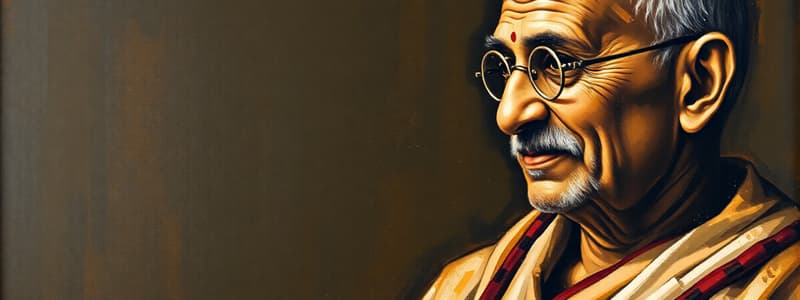Podcast
Questions and Answers
What was one consequence of the Jallianwala Bagh Massacre?
What was one consequence of the Jallianwala Bagh Massacre?
- Destruction of villages (correct)
- Rise of non-violent protests
- Establishment of democratic practices
- Formation of new political parties
During which session of the INC was 'Purna Swaraj' formally adopted?
During which session of the INC was 'Purna Swaraj' formally adopted?
- 1916 session
- 1929 session (correct)
- 1930 session
- 1942 session
What major power did the Rowlatt Act grant to the British Government?
What major power did the Rowlatt Act grant to the British Government?
- The ability to release political prisoners without trial
- The capability to increase tariffs on imports
- The authority to form independent trade unions
- The power to prohibit political activities (correct)
Who were the founders of the Khilafat Movement?
Who were the founders of the Khilafat Movement?
What was a restriction placed on plantation workers under the Inland Immigration Act of 1859?
What was a restriction placed on plantation workers under the Inland Immigration Act of 1859?
What was the main method used by Mahatma Gandhi in his activism for nationalism?
What was the main method used by Mahatma Gandhi in his activism for nationalism?
What event prompted nationwide protests and anger among Indians in 1919?
What event prompted nationwide protests and anger among Indians in 1919?
Who were the leaders that initiated the Khilafat Movement?
Who were the leaders that initiated the Khilafat Movement?
What significant action did Gandhi undertake in 1930 to protest the salt tax?
What significant action did Gandhi undertake in 1930 to protest the salt tax?
What was the outcome of the Poona Pact signed in 1932?
What was the outcome of the Poona Pact signed in 1932?
When did Mahatma Gandhi return to India from South Africa?
When did Mahatma Gandhi return to India from South Africa?
What was observed across India on April 6th, 1919?
What was observed across India on April 6th, 1919?
Which British law allowed for the repression of political activities in India in 1919?
Which British law allowed for the repression of political activities in India in 1919?
Study Notes
Mahatma Gandhi’s Role in Nationalism
- Mahatma Gandhi returned to India from South Africa in 1915.
- Gandhi's method of non-violent resistance was called Satyagraha, meaning “truth force”.
- In 1917, Gandhi organized the Champaran Satyagraha to support oppressed plantation workers.
- In 1918, Gandhi, alongside Sardar Vallabh Bhai Patel, went to Kheda to support peasants facing unfair tax demands.
Jallianwala Bagh Massacre
- In response to unrest, the British government passed the Rowlatt Act in 1919, which allowed for the detention of political prisoners without trial for up to two years.
- On April 13, 1919, during a peaceful gathering of villagers at the Jallianwala Bagh park in Amritsar, General Dyer blocked the only exit and ordered his troops to open fire.
- The massacre resulted in the deaths of thousands of unarmed civilians, including men, women, and children.
Khilafat Movement
- The Khilafat Movement was started by brothers Shaukat Ali and Muhammad Ali in response to the harsh treatment of the Ottoman Caliph, the spiritual leader of many Muslims.
- Mahatma Gandhi supported the movement, recognizing its potential to unite Hindus and Muslims in a common cause against British rule.
Salt March
- Mahatma Gandhi launched the Salt Satyagraha in 1930, demanding the abolition of the oppressive salt tax imposed by the British.
- The march began with 78 volunteers from Sabarmati Ashram near Ahmedabad, walking over 240 miles to the coastal town of Dandi, where they made salt in defiance of the British law.
Poona Pact
- In 1932, the Dalit leader Dr. Bhimrao Ramji Ambedkar demanded separate electorates and reserved seats for Dalits in the upcoming elections.
- This demand divided the Congress Party, but ultimately led to the Poona Pact, a compromise agreement between Gandhi and Ambedkar.
- The pact granted reserved seats for Dalits within the existing general electorate, fulfilling a key demand of the Dalit community.
Studying That Suits You
Use AI to generate personalized quizzes and flashcards to suit your learning preferences.
Related Documents
Description
Explore the significant events and movements led by Mahatma Gandhi that shaped Indian nationalism in the early 20th century. This quiz covers Gandhi's non-violent resistance strategies, the Jallianwala Bagh Massacre, and the Khilafat Movement, highlighting their impact on the struggle for independence. Test your knowledge of this pivotal period in Indian history.




